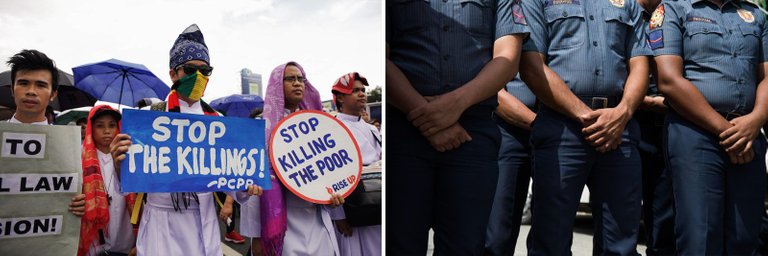
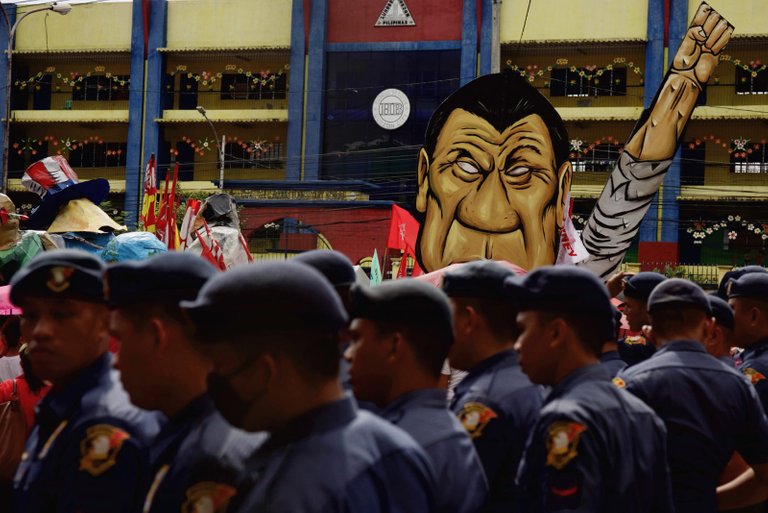
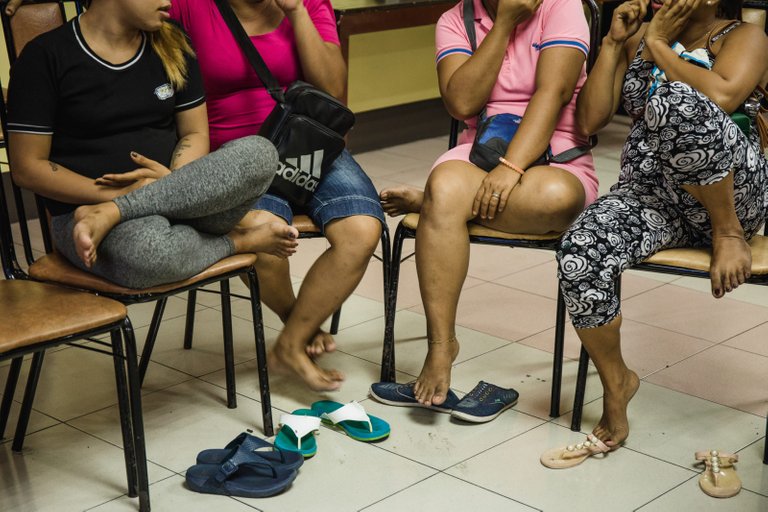 You’ve heard about the thousands of Filipinos murdered in Duterte’s drug war. Here’s what’s happened to those left behind.
You’ve heard about the thousands of Filipinos murdered in Duterte’s drug war. Here’s what’s happened to those left behind.
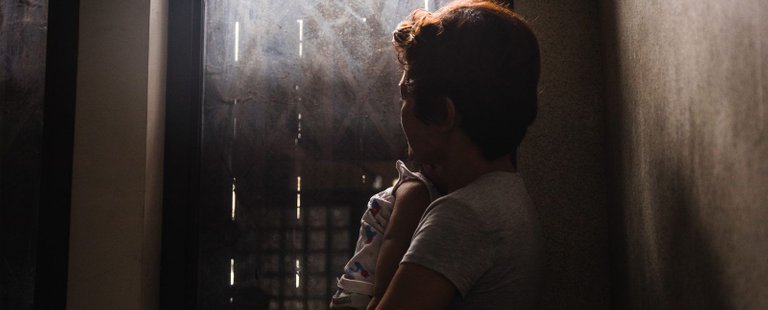
In the days after Sara’s husband and 19-year-old son were shot by police in what was labeled a buy-bust drug operation, Sara (whose name has been changed here for her safety) trembled at the sight of every police officer. She spent her days staring into nothing; she couldn’t sleep, she couldn’t eat, and there were times when she nearly lost her will to live.
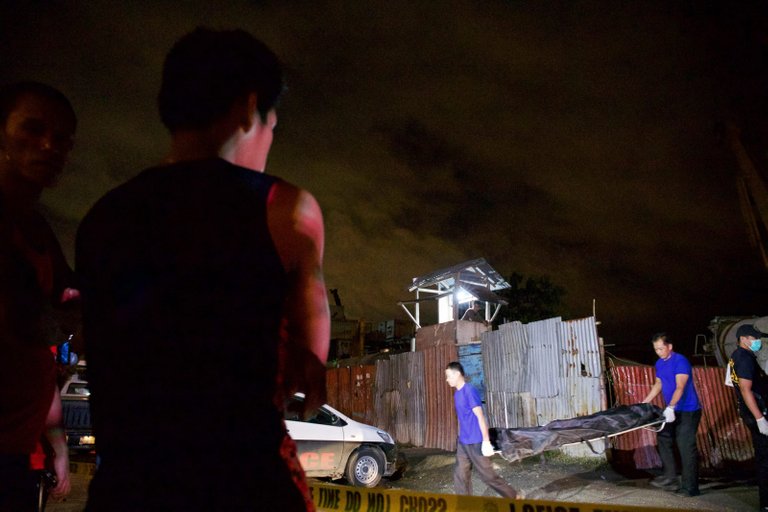
A crime scene in Navotas City, Philippines, one of the places that have become notorious for drug-related killings.
Since President Rodrigo Duterte assumed office in 2016, the bodies of suspected drug users and dealers have shown up on highways, in parking lots and along the narrow alleys of Metro Manila’s shantytowns with alarming frequency. Their stories share a common thread: the suspects, many of whom are on drug watch lists, are either killed by police in what they say were drug operations gone awry, or shot by masked vigilantes on motorcycles (some of whom are believed to be police officers in disguise). This controversial drug war, which helped propel Duterte to power, has already claimed thousands of lives: while government sources maintain that as of November 2017, 3,967 “drug personalities” have been killed, activists and groups like Human Rights Watch claim that the number of victims is now over 13,000.
Sara’s husband and son were two such victims. Their village official asked Sara’s husband, a small-time drug runner, to be one of the first to admit to authorities that he had used drugs, so he could set an example. “He was told that by admitting to using drugs, he could show other people like him that they could change,” says Sara.
However, on September 15 last year, more than 15 police officers entered their home without a warrant, said Sara. The police told them, “We are just searching,” according to Sara, although it was unclear to her what they were searching for. They later labeled it a buy-bust drug operation, although she says her husband had stopped using and dealing drugs by then.
Police forced Sara and her younger children out of the house, but her son refused to leave his father’s side. When Sara ran outside to the narrow alley and called for help, she heard the unmistakable sound of gunshots. Her family didn’t own a gun and her husband and son would never have fought back, she says. But law enforcement has a different story. According to the police report, Sara’s husband and son resisted, and were killed in the struggle.
In the months after her son and husband were killed, Sara retreated into herself, not knowing who to talk to or how to cope. In addition to her late son’s one-year-old, she still had four more children to take care of, ages nine through 19. They would say to her, “Mom, don’t be like that. We’re still here.” Sara didn’t want to talk about what she went through, in the hopes that the creeping feelings of sadness and fear would disappear if only she could forget what had happened.
“I was afraid of remembering,” she says. But whenever she hears about another police killing of suspected drug dealers for allegedly resisting arrest, she remembers the last time she saw her unarmed son, facing the police and begging them to spare his father.
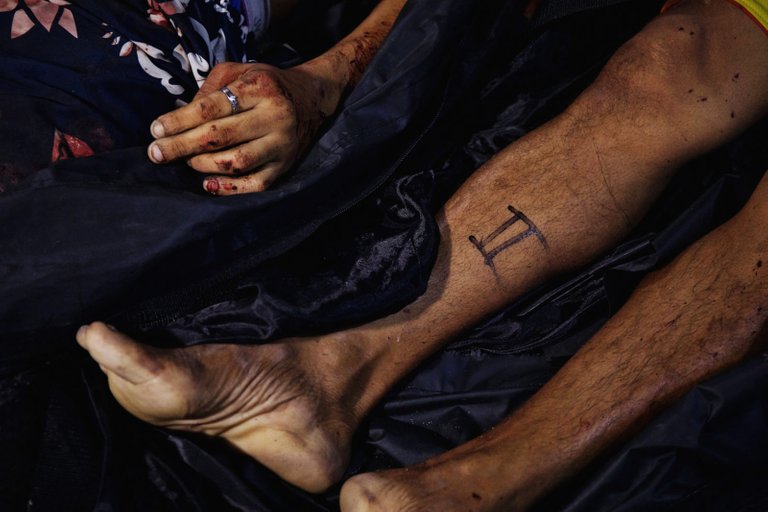
Unidentified bodies located in a morgue, where many victims of the drug war are brought for their families to find. Gallery Slideshow
Unidentified bodies located in a morgue, where many victims of the drug war are brought for their families to find.
“We get traumatized over and over again,” says Sara. She muses that she would like to tell government leaders that in addition to the challenges of rehabilitating drug users, “They now have to worry about mental hospitals because many people are traumatized and afraid.”
One afternoon in August of 2017, Sara sits in a makeshift counseling room filled with the sharp smell of turmeric. Located behind a store that sells crucifixes, statues of saints and rosaries, the room has walls that are painted yellow, with a red ceiling and blue accents — the colors of the Philippine flag. Here, in a counseling session organized by a group called Rise Up for Life and for Rights, Sara recounts her story to a volunteer psychologist and 15 other people with experiences like hers. Each of them have lost a sibling, spouse, child or a parent to the drug war.
The families, seated in a circle with a volunteer psychologist, share violent narratives: one is a mother whose son, a drug user, was shot to death along a railroad; another is a woman who found her stepson in the morgue after neighbors last saw him with police. She says he never used drugs.
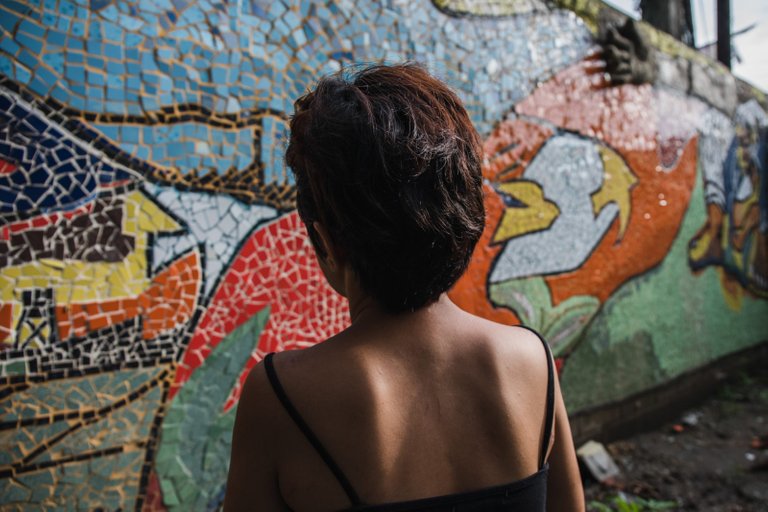 Sara in front of a mosaic she helped make with other survivors and members of Rise Up. Gallery
Sara in front of a mosaic she helped make with other survivors and members of Rise Up. Gallery
Sara in front of a mosaic she helped make with other survivors and members of Rise Up.
Surviving family members of drug-war victims at a Rise Up group counseling session.
“When things like this happen, there is intense sadness, anger and guilt,” Professor Maria Cruz tells the kin of slain drug suspects in the room, many of whom were witnesses to the deaths of their own family members. Cruz, who also asked that her real name not be used for her own safety, is one of the volunteer psychologists enlisted by Rise Up for Life and for Rights to help families of slain drug suspects process and recover from their experiences. “It’s important to express those emotions in a context like this where it is easy to share. Because if not, it can become a volcano that will someday just explode.”
Rise Up is one of the few organizations that provide community-based psychosocial therapy to families affected by the drug war. Composed of various church groups and advocates, they also help surviving family members file legal cases and rehabilitate recovering drug users.
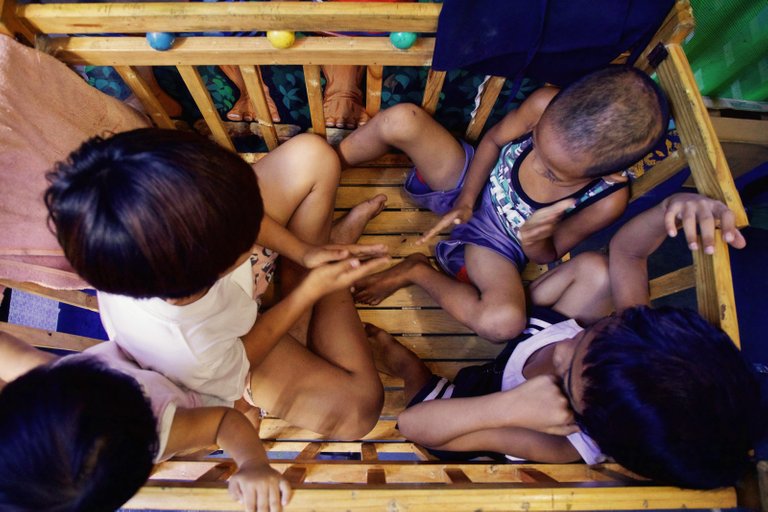
Children who have lost family members to the drug war play during a Rise Up counseling session.
Cruz says that most of the individuals she counsels have post-traumatic stress disorder, anxiety or depression, and some have suicidal ideation. The need for psychosocial services for witnesses and relatives of slain drug suspects is overlooked, according to Cruz, because, “in the Filipino culture, when someone close to you dies, you are expected to get over it.”
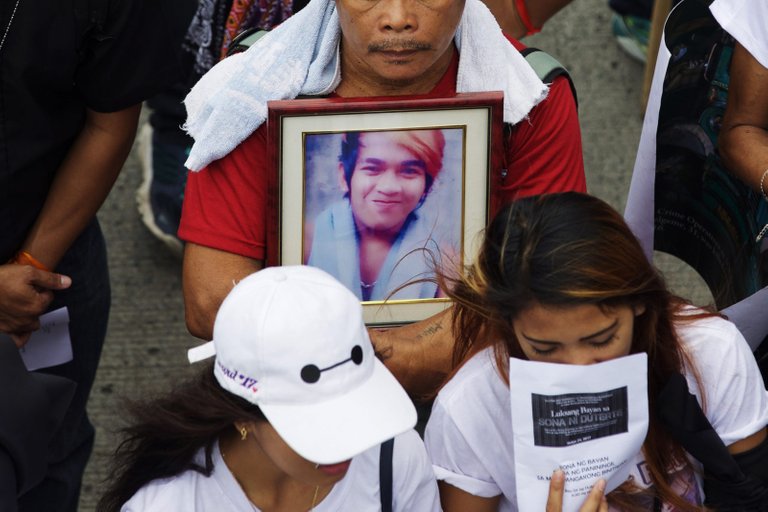
A father of a slain drug suspect clutches a photograph of his late son at a rally in Quezon City, Philippines, on July 24, 2017.
The aftermath of these killings is made even more difficult by lingering fear, says Cruz. Many live in fear of being killed by the same people who murdered their relatives. Like a number of families of slain drug users, Sara and her family had to move away from their home. This displacement only adds to their emotional distress.
Moreover, the strong support for the drug war among most Filipinos only worsens the grieving process. “Since drug use is stigmatized in the communities, people have this perception that it served them right. These victims are looked down [upon] in the community and viewed as plagues, because that’s how the government portrays them,” says Cruz. “So instead of compassion, oftentimes, families are not even pitied. Instead, they are shunned, and that adds to their trauma.”
“You eliminate [the drug personalities] and not only are you impacting them, but their children and their families,” says Rebecca Lawson, an organizer at Rise Up. “You’re causing so much trauma in the whole community… How can this possibly lead us to a better situation?”
Left: A neighborhood in a poor area of Quezon City, Philippines, where drug-related killings have become a frequent occurrence. Right: A drug drop box encouraging local residents to submit the names of suspected drug dealers and users in an affluent area of Quezon City. Gallery Slideshow
Left: A neighborhood in a poor area of Quezon City, Philippines, where drug-related killings have become a frequent occurrence. Right: A drug drop box encouraging local residents to submit the names of suspected drug dealers and users in an affluent area of Quezon City.
While some families at Rise Up report having received some financial support from the government to bury their dead, others say they weren’t compensated at all. Most, if not all, never received any psychosocial support following the death of their loved ones — until Rise Up stepped in.
Cruz says that if left unchecked, grief and trauma may lead to more severe forms of depression and anxiety, psychosis, or unhealthy coping mechanisms like substance abuse. Organizers at Rise Up say that families who have lost loved ones to the drug war are especially vulnerable, due to the lack of awareness about mental health among Filipinos.
Mental health resources are, in fact, available for free in a few public mental health facilities across the country, but they are scarce and far apart. Cruz says people from low-income communities typically have no idea that they could see a doctor for mental health issues, and even if they did, few would be able to afford the commute. In the day-to-day struggle of making ends meet, their emotional well-being takes a back seat.
A crime scene on August 18th, 2017, in one of the slums of Manila, which has become known for frequent drug-related killings. On one particularly deadly night in August of 2017, 32 people were reportedly killed in a single night. “That’s good,” Duterte said in a speech shortly thereafter, “Let’s kill another 32 every day. Maybe we can reduce what ails this country.” Gallery Slideshow
 A crime scene on August 18th, 2017, in one of the slums of Manila, which has become known for frequent drug-related killings. On one particularly deadly night in August of 2017, 32 people were reportedly killed in a single night. “That’s good,” Duterte said in a speech shortly thereafter, “Let’s kill another 32 every day. Maybe we can reduce what ails this country.”
A crime scene on August 18th, 2017, in one of the slums of Manila, which has become known for frequent drug-related killings. On one particularly deadly night in August of 2017, 32 people were reportedly killed in a single night. “That’s good,” Duterte said in a speech shortly thereafter, “Let’s kill another 32 every day. Maybe we can reduce what ails this country.”
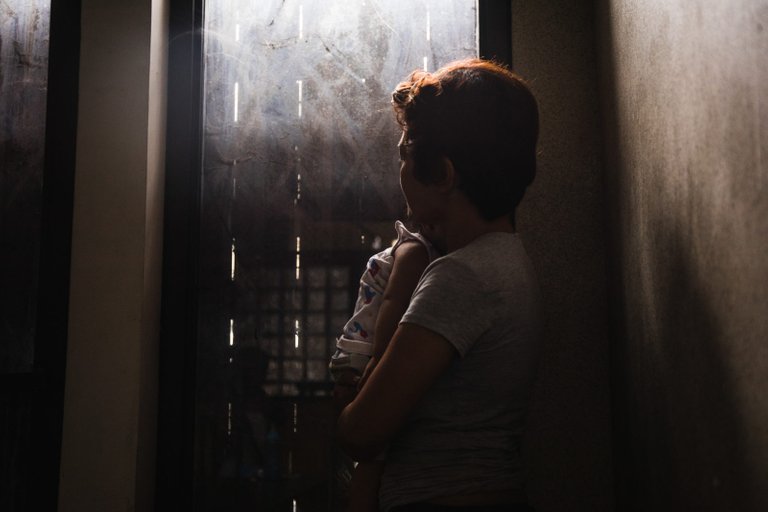
Sara poses for a portrait while cradling her late son’s one-year-old son.
“The urban poor have no concept of going to a doctor to treat psychological symptoms, because their priority is what they have to eat every day. They don’t even have enough money to buy painkillers,” says Nardy Sabino, an organizer at Rise Up. “You can’t expect them to seek professional help for their emotions.” He says these families are in “survival mode,” wherein economic hardships make all their other needs subsidiary to day-to-day basic necessities.
This was the case for Sara, who didn’t know where or how to ask for help for herself and her children. Like many of those that Rise Up serves, Sara lived in a town of shanties where many work as household helpers or make a living selling food along the street. Unable to seek help, she and her children focused on trying to live as normally as they could.
“We just continued with our lives, even though we were devastated and were always crying,” says Sara. “To ease the sadness, I just told my kids that my son and my husband were going to come back and we pretended like they were just on vacation.”
When Rise Up organizers get word of another killing, they visit grieving families’ homes and pay their respects to the dead. At first, says Sabino, people are generally afraid of talking about what happened, but once organizers say that they are from the church, survivors tend to open up more. When they do, Sabino educates them about signs of trauma and other psychological symptoms. Adults undergo individual counseling and group sessions, while children process emotions through art therapy.
After treating hundreds of people affected by the drug war, organizers have realized that healing requires more than just talking about how they feel. Since all of their beneficiaries come from low-income communities and most do not have stable jobs, livelihood programs are essential. So Rise Up also teaches them marketable skills like how to make artwork out of broken tiles, and how to produce turmeric and ginger powder, which they can sell on the street.
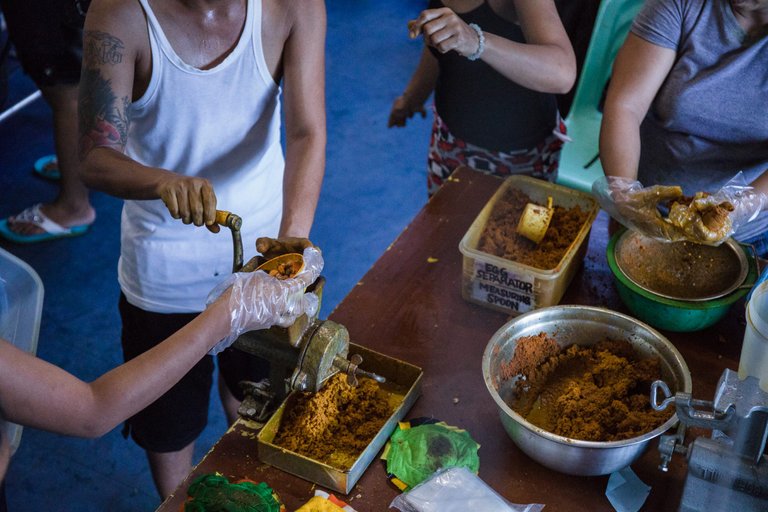
Rise Up organizers teach surviving family members of drug war victims how to make turmeric powder, which they can sell in order to support their families.
Rise Up organizers like to think of their program as a “package deal;” they say people can’t be mentally healthy if they are always worrying about how to get through another day. By addressing their medical and economic needs, they believe that psychosocial support will become more effective and more sustainable in the long run.
“We didn’t think we could laugh again,” says Sara, who says she found a community at Rise Up for Life and for Rights. “Whenever we have psychosocial sessions and whenever we get to interact with other people, we get to express how we feel, which we’ve been suppressing.” Cradling her late son’s one-year-old child, she declares, as if she were appealing to President Rodrigo Duterte himself, “We’re not asking for money…what we want is freedom, peace of mind, so we can go home.”
Michelle (whose name is changed here for privacy), the stepmother of a slain drug suspect, in a church in Manila. “I was really looking for someone who can help, not just financially,” she says. “Someone to talk to about how I feel. It’s really heavy.” Gallery Slideshow
Michelle (whose name is changed here for privacy), the stepmother of a slain drug suspect, in a church in Manila. “I was really looking for someone who can help, not just financially,” she says. “Someone to talk to about how I feel. It’s really heavy.”
“It makes a difference, knowing that there’s someone who’s willing to help you, someone who’s willing to be there for you,” says Michelle, who found her stepson’s body at the morgue after he didn’t come home from work one day in January 2017. Afterwards, she says she and her husband became extremely paranoid around police officers, but this fear subsided after she met Rise Up organizers and other surviving mothers like herself. “It’s different when you’re talking to someone who can understand what you went through because they experienced it as well.”
Ultimately, Rise Up tries to live up to its name, and hopes that they can serve families not only by teaching them to heal and sustain themselves, but also by empowering them.
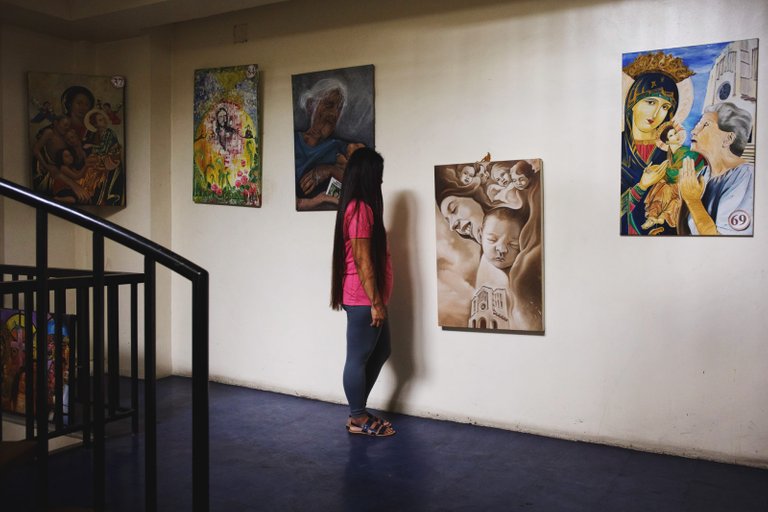
“Some psychosocial programs are designed to help people accept their loss,” says Sabino. “But our purpose is to teach them how to rise and realize that they have a role in stopping the killings and changing society.”

Left: Friends and family of slain drug suspects protest the killings at a rally in Quezon City. Right: Police officers form a human barricade during the rally.
On July 24, 2017, a rally was held along a Quezon City highway during President Duterte’s second State of the Nation Address. Sara, her face hidden behind a scarf, holding a photo of her late son and husband, faced about 100 people, including activists, priests, nuns and other kin of slain drug suspects, who formed a circle around her. Some of them held photos of bloody crime scenes, others held signs. It was Sara’s first time speaking publicly about her experience. A few yards away, hundreds of police officers formed a human barricade. Sara trembled when she looked at them, but spoke steadily into the microphone, her voice cracking ever so slightly. “Every time we see another person killed, we remember what happened to our families,” she said, hesitantly looking from one person to another, but with conviction in her voice. “We remember the abuses we went through. We just want the killings to stop.”
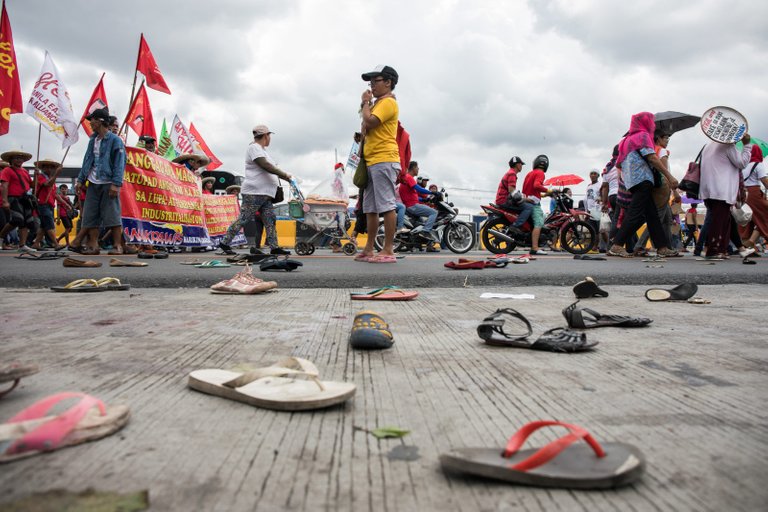
Shoes on the ground at the rally protesting Duterte’s drug war represent the number of slain drug suspects, July 24, 2017.
Sara, who now regularly joins rallies against drug-related killings, is still haunted by the memory of her husband and son’s violent deaths. Now, however, she is finally comfortable sharing these memories with survivors like herself.
“Instead of being sad, we can be strong and rebuild our families,” she tells them. “Do not be afraid to tell the truth.”
Funding for this story was provided in part by the Pulitzer Center on Crisis Reporting.
Story by Pat Nabong
source:http://narrative.ly/government-killed-families-now-women-helping-survive/